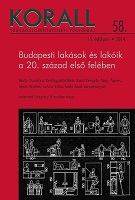A népesség megfelelő eloszlása a térben. A lakótér elosztásának képzetkörei a 20. század első felének magyar társadalmában
The Optimal Spatial Distribution of the Population. Perceptions of the Distribution of Living Space in Hungarian Society in the First Half of the Twen
Author(s): Ágnes NagySubject(s): History
Published by: KORALL Társadalomtörténeti Egyesület
Summary/Abstract: In relation to rent-controlled housing policies, the study examines the continuity and changes in the discourse, ways of thinking, and organisation of linguistic forms concerning the spatial distribution of living spaces in Hungarian society between the First World War and the end of the Second World War. According to the basic premise of the study, the changing discourse reflects the process of mental transformation in society, which, in this period, primarily concerns the transformation of Hungary’s social and political environment. To describe these processes, the study briefly summarises the effects of the government’s housing regulations on social norms of housing during the First World War and the rationale behind the housing standards between the two world wars. These shed light on the evolution of the normative perception, which converged in the experience of ‘narrowing’ and ‘contracting’. This experience was expressed in spatial metaphors dominating the discourse, which at the same time fundamentally perceived housing conditions in terms of a Jewish- Christian dichotomy. The second part of the study gives an analysis of the linguistic forms in this discourse during the Second World War, when the return of state-controlled housing policy brought about a proliferation of new images and the ultimate transformation of the perceptions of spatial distribution. The changes in perceptive schema and linguistic forms point to a new pattern: the idea of ‘propriety’ was replaced by ‘entitlement’ as the main determinant of the relationship between the size of dwelling and social status. Furthermore, social status was replaced by a Jewish-Christian dichotomy and the concept of ‘social value’, which meant that entitlement was beginning to be perceived according to increasingly merit-based principles.
Journal: Korall - Társadalomtörténeti folyóirat
- Issue Year: 2014
- Issue No: 58
- Page Range: 69-93
- Page Count: 25
- Language: Hungarian

